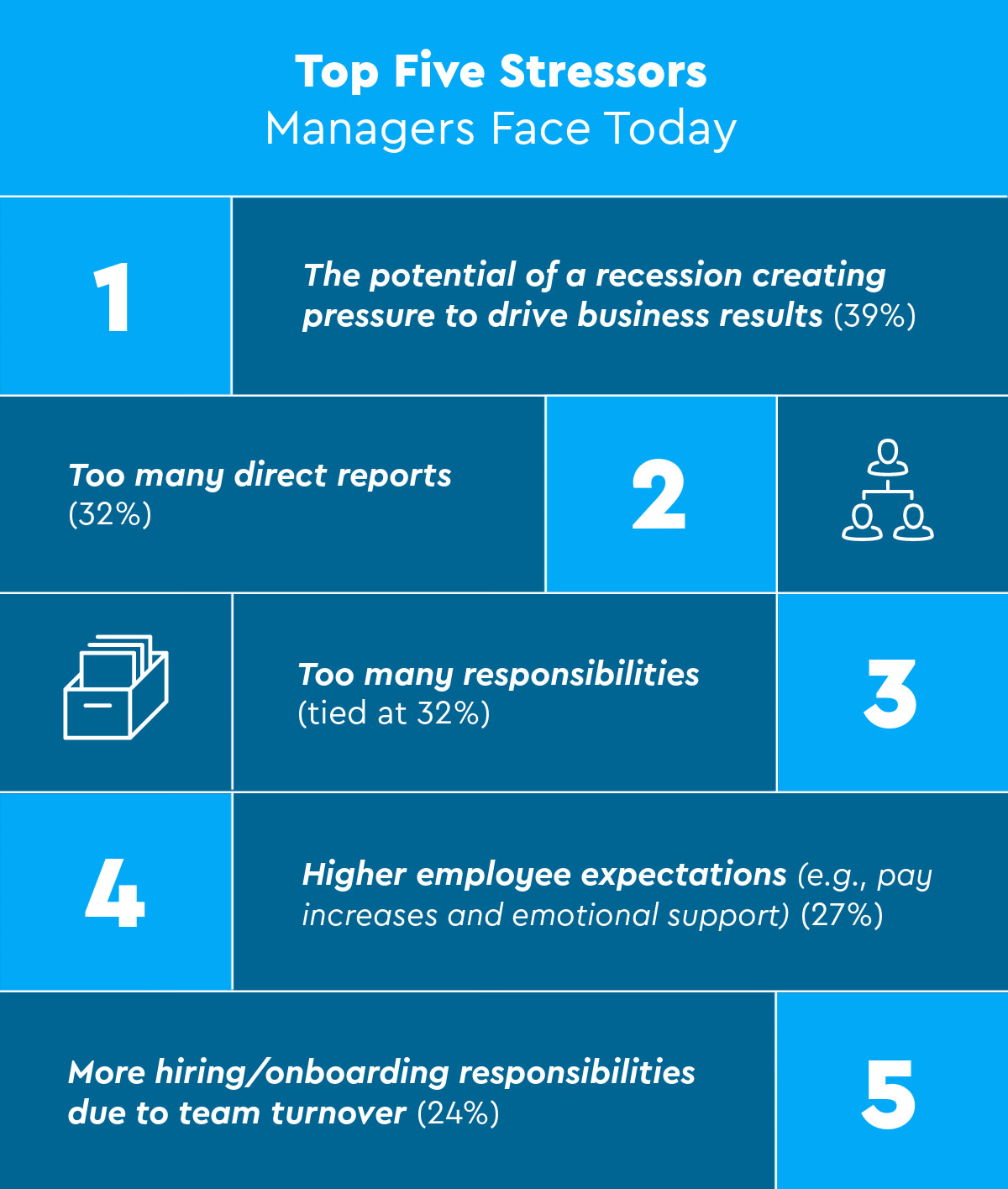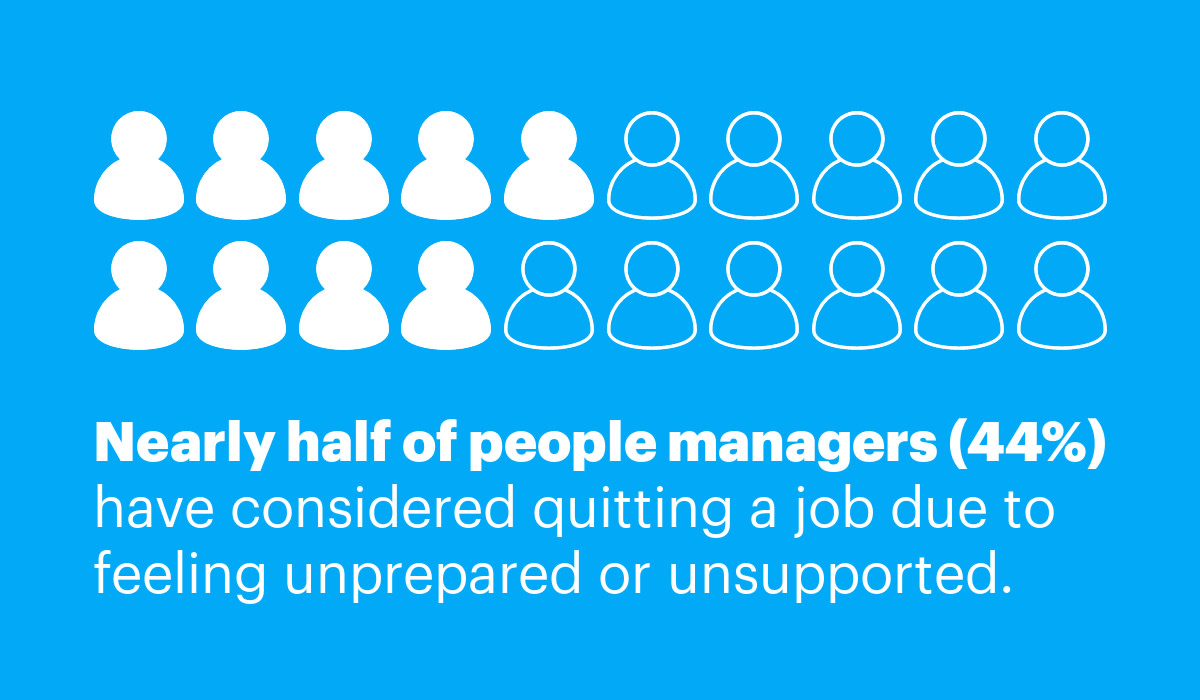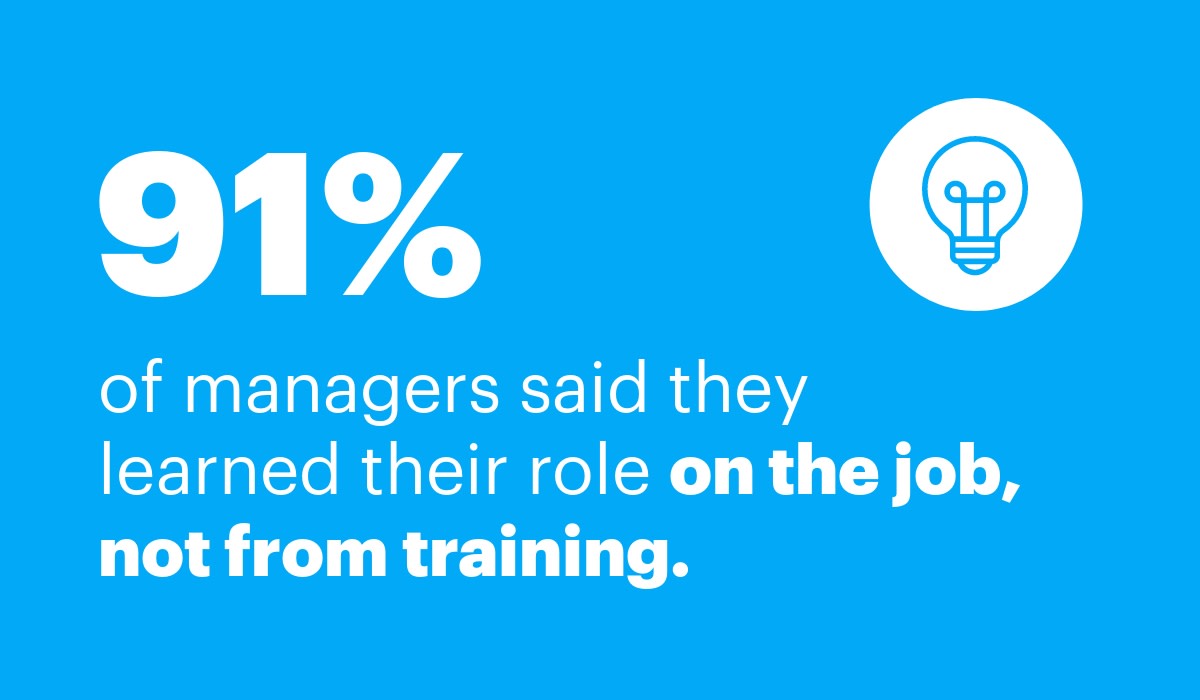New Manager Effectiveness Research Shows They Are More Stressed Than a Year Ago
Results from our new manager effectiveness survey show people leaders are more stressed than a year ago, need more support.

An organization’s success starts with its people—and behind every good employee is a good manager. But in today’s business environment, people management comes with new and often complex challenges, complicating manager effectiveness.
The Great Resignation has left teams understaffed and managers struggling to make time for additional responsibilities like onboarding a continuous flow of new hires. And now a looming recession is adding to the pressure. Amid these external forces, employees also expect more from their employers than ever before—whether it be increased emotional availability in the workplace or greater pay transparency.
To dive deeper into these challenges, Visier surveyed 500 U.S.-based, full-time people managers about what motivates them, current job stressors, and the nature of their relationships with direct reports. The survey revealed that while a vast majority of people managers enjoy their roles and feel confident in their skills, they also face increasing pressure and a growing number of responsibilities.
Top 5 reasons managers are stressed out
The good news is that 98% of people managers enjoy their roles. The not-so-good news? Almost two-thirds of managers (62%) are more stressed out than they were a year ago. The average manager-employee ratio went from its pre-pandemic 1:4 to 1:6, placing more work (and pressure) on managers’ plates.
Top five stressors managers face today:
The potential of a recession creating pressure to drive business results (39%)
Too many direct reports (32%)
Too many responsibilities (tied at 32%)
Higher employee expectations (e.g., pay increases and emotional support) (27%)
More hiring/onboarding responsibilities due to team turnover (24%)

In addition to these stressors, managers often have to enforce organizational policies that don’t align with their personal beliefs. While most people managers (91%) feel they can be honest with their superiors and direct reports if they disagree with a company policy, 65% have been asked to enforce a policy they disagree with.
Managers enjoy their roles, but they’re quickly burning out as they face challenges they aren’t always equipped to navigate. From understaffed teams to an uptick in responsibilities, it’s not surprising that nearly half of people managers (44%) have considered quitting a job due to feeling unprepared or unsupported. To fight high turnover and increase manager effectiveness, employers need to ensure their people managers have a space to voice concerns to leadership and mentors who can offer guidance on tackling management-related issues.

Managers enjoy supporting direct reports, but they need support, too
The top reason people managers enjoy their roles isn’t career advancement opportunities or salary increases—it’s the ability to provide support. In addition to the 81% of respondents who said they enjoy helping other people evolve and grow in their roles, 46% said they like that their roles let them have more of a say in the direction of their teams and organizations.
Top reasons people managers enjoy their roles:
They enjoy helping other people evolve and grow in their roles (81%)
Being a manager lets them have more of a say in the direction of their teams, departments and company (46%)
They enjoy providing emotional and personal support to their direct reports (39%)
They feel like they have more of an impact as a manager than they would as an independent contributor (36%)
They enjoy the day-to-day responsibilities of being a manager (32%)

Managers not only like their roles, but they also believe they’re good at them. More than two-thirds of respondents rated themselves as “very confident” in their ability to complete day-to-day job duties as a manager as well as other key management tasks such as leading a team of more than one or two people, setting boundaries with direct reports, and setting clear, business relevant-goals for their teams. But, for the most part, managers’ sense of self-assurance doesn’t stem from formal training. Most managers (91%) said they learned skills like these on the job as opposed to formal training—with 53% strongly agreeing with the statement.

Experiential learning is invaluable when it comes to people management since every direct report a manager coaches present unique challenges and experiences. At the same time, it’s important for organizations to supplement on-the-job learning with formal manager-effectiveness training—especially when it comes to responsibilities that are new to managers. For example, organizations can hold training sessions for new managers about how to efficiently onboard and train multiple new hires at the same time.
Are managers the new therapists?
Managers and direct reports both see their workplaces as more than a place to check off boxes on their to-do lists. Today, the workplace is also a space to form genuine connections with the people around you, which makes sense considering how much time employees spend with their colleagues.
Consistent with this shift, the role of the manager has evolved to encompass more than just delivering performance feedback and monitoring work outputs—soft skills like empathy are becoming essential managerial traits as more direct reports look to their supervisors for emotional support. In fact, more than half (52%) of people managers have experienced a direct report opening up about family or relationship issues.
Common emotional topics employees want to discuss with their manager:
Family/relationship issues (52%)
A work-related matter (51%)
Financial issues (48%)
Their mental health (47%)
A non-work-related matter (36%)
This emotional availability is a two-way street. Over three-quarters of managers (77%) say they’re open with direct reports about their personal lives, with half saying they’re very open. Additionally, 97% of managers feel confident in their ability to set boundaries with their direct reports and clarify which aspects of their personal life it’s okay to share.
Emotional availability is a good thing—an empathetic and transparent manager puts employees at ease knowing they can bring their authentic selves to work. But high levels of emotional availability can overburden managers if they aren’t equipped to handle these situations, placing them at a higher risk of burnout. To make emotional availability a reality in the workplace, support from company leadership is a must for empathetic manager effectiveness. Employers should encourage open and honest communication, but also provide managers the tools and resources that hone the soft skills needed to handle emotionally charged conversations.
Support your managers the way they support their direct reports
People managers play an instrumental role in driving positive employee experiences, encouraging sound decision-making, and keeping their teams motivated and engaged. But the nature of the workplace is evolving—and how you invest in your people managers should be, too.
Our research makes it clear that today’s managers are under more pressure than they were a year ago, both from external economic forces and internal factors like increasing employee expectations. And if you fail to provide your people managers with the right resources and support, unattainable workloads will continue to overwhelm—or worse, drive away—these valuable team players.
The most effective way to understand your people managers’ needs? Ask them. While our findings showcase national trends in people management, every workforce faces its own challenges. You have to know what’s happening on an individual and aggregate level so you can give your people managers more of the work they enjoy and the tools they need to succeed.
To learn more about using people analytics to address management challenges, get in touch.
Get Outsmart content straight to your inbox
Subscribe to the People Insights Monthly newsletter for actionable insights and stories.
Subscribe now